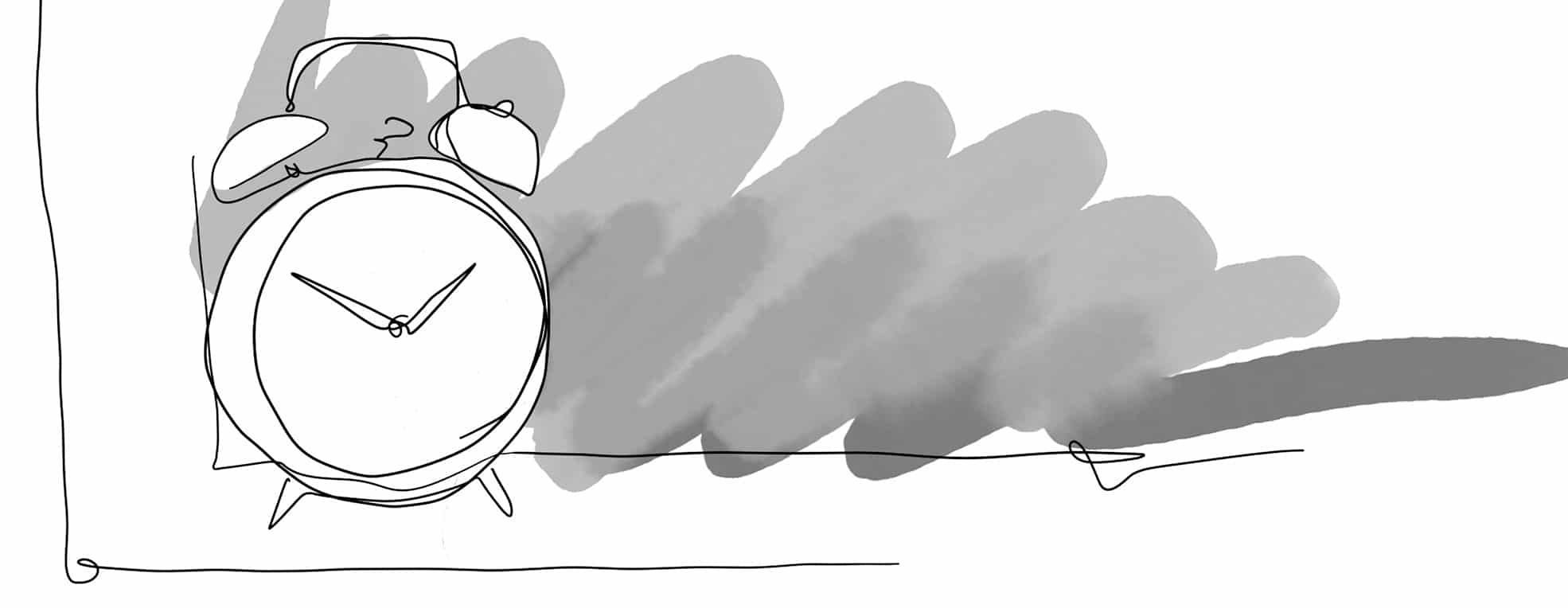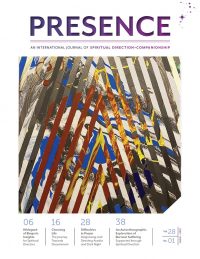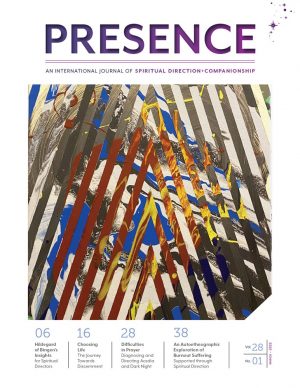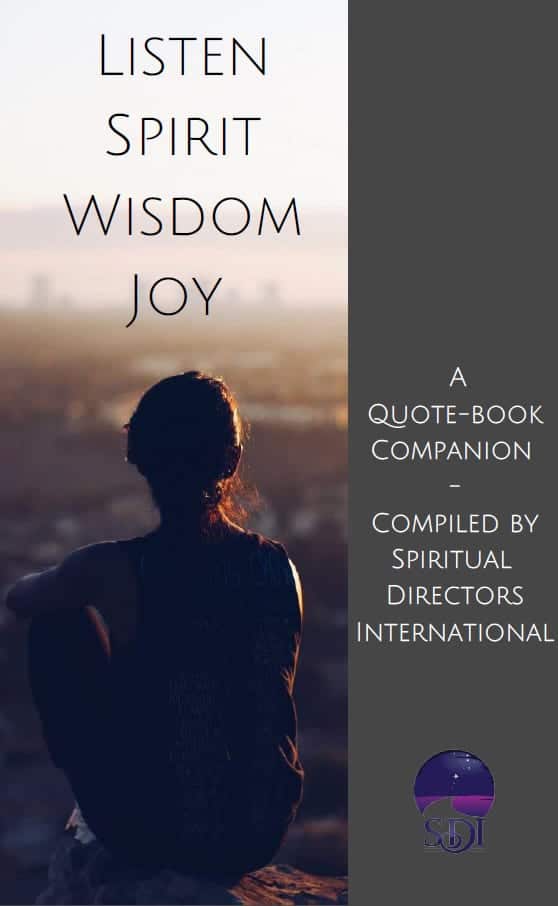First, I hear you echo the words. Acedia. Dark night.
These words are my response to your story. One of faith stuttering. Stumbling into passivity. God now distant. Weariness in prayer. And sadness. So much sadness.
I hear you echo these ancient words. And, as you say them, I hear the question that lilts upwards in your voice just now rising.
Well, it might rise. For these are not words well-known to our tribe. Evangelicalism is happy and we are certain of what we know. We sing loudly, pray boldly—and we are just so in love with Jesus. We are sure. So sure.
And when we are not, when sadness and difficulty are insurmountable, we tell ourselves to try harder. Read the Bible more. Pray more. Get in a small group. Keep going to church. More, more, more.
We tell ourselves even as our souls sink in desert depths, sand almost up to our noses.
We tell ourselves because our tribe has not taught us words like acedia, like dark night. Not taught us to expect desert sandstorm nor told us of cleft in that rock.
Acedia, a sadness and a weariness in faith that mean failure to continue in friendship with Christ. This is my compressed definition, a fuller discussion for once not locked behind a paywall. Throughout Christian history, this one is called sin. Sin, but also a demon.
Dark night, a journey deeper into God, one so often made in darkness and silence. Removal of all felt joy, presence now a seeming absence. This one is not sin. Not a demon either. Instead, an unexpected gift.
Acedia and dark night. Each, sadness. Each, weariness. One of them is sin, the other to be weathered as a costly gift.
And me to tell their difference. Whether soul’s desert-sinking is sin-drowning or sandblasting with grace.
This is my Hobab-task, a wilderness guide to pilgrim hearts.
I am a spiritual director and an academic theologian. Those whom I serve are predominantly evangelical Christians. And our language for weariness in prayer, for a growing passivity, and for a God now distant, is confined largely to talk about the desert.
It is not that there is anything wrong with the desert. The metaphor is biblically rich: Israel’s exodus—hemmed in by wilderness, toiling through it, and yet there encountering the living God—gives way to prophets like Elijah in Cherith, cutting through the Beersheba wilderness, dependent on food from ravens and cakes from angels The desert is a place of tender speaking, a place where Revelation’s-Woman of the Apocalypse flees. It is a place where Jesus himself is led by the Spirit.
The saints, too, have drawn deeply from the well of the desert. The first Carmelites (the tradition of direction in which I trained), count Elijah as their father. Before them, desert fathers and mothers inhabited their caves and sought the silence of wide, empty lands.
Yes, the desert is rich and describes well the presence of God that is more like absence—the speaking of God that is more like silence. The desert tells of the quietening of the soul until passivity reigns—whether that be passive receptivity to God or passivity that is a heart closed down. But the tradition says more about these experiences of weariness, emptiness, and passivity than only the desert. And my task as a spiritual director and academic is to read that tradition deeply and distil it wisely for the sake of those I serve.
On more than one occasion, I have said these words—acedia and dark night—to those in the chair across from me. And on more than one occasion, they have balked a little and asked the question inviting more. When they have been my students, I have humoured them: teaching spiritual theology must mean a willingness to speak of concepts, to engage in the cognitive space. The cognitive space is one of definitions and differentiations. But when those who have asked me have been my spiritual directees, I have held back from definitions of acedia or dark night. With these, instead, I have sought to diagnose. For the conceptual definitions may allow for conceptual differentiation—but differentiation is best used in practical diagnosis and direction.

Definitions and Differentiation
Acedia is not the most well-known of sins. In fact, most evangelicals look at me blankly when I say the word. Over time, acedia has become known as sloth, although sloth is not the whole of this ancient sin. It appears first with Evagrius of Pontus, as a weariness in relation to both time and place (Evagrius of Pontus; Sinkewitz, 99), and again in John Cassian as avoidance of both private prayer and of corporate forms of seeking God (Cassian; DeYoung, 175–76). Thomas Aquinas later defines acedia as the sin of sorrowing over the divine good, which is friendship with God (Aquinas, II-II 35.4). Though an acedic person may long for God, they ultimately find the longing too costly to sustain: in the battle of flesh against spirit, flesh prevails. And, thus, they fail to continue in friendship with God. They no longer delight in him and cease responding to his overtures of love with their own acts of love (Lynch, 129).
Acedia’s symptoms may consist of a lack of desire for spiritual reading and prayer, a general sense of frustration, and even sleepiness or ill health. Such are the symptoms that the more modern word—sloth—describes. But, as Thomas Aquinas notes, acedia also may be typified by restlessness, a (hyper)activity born of desperation to escape the difficulties and humdrum sameness of the life of faith (Aquinas).
Another Christian writer, John of the Cross, describes acedia too. His discussion is particularly interesting in light of what he also has to say about dark night. For him, acedia is a withdrawal from the work of prayer. The believer feels weariness in their practice of spiritual exercises and so largely lets their prayer habits slide because their efforts give them no pleasure. In making such a choice towards passivity in prayer, they betray the fact that their joy, which is opposite to acedia’s sadness, is not in God but rather in the pleasures he gives (John of the Cross, 1.7–2.3).
With joy in God gone, sadness and weariness may take root and may even, John says, become an aversion to submission to God. The passivity in prayer that acedia produces, then, is a kind of faithlessness, a choice no longer to wait for God in the tension of a presence that feels like absence.
“The passivity in prayer that acedia produces, then, is a kind of faithlessness, a choice no longer to wait for God in the tension of a presence that feels like absence.”
—Jb 12:7–10.
But there is another possible explanation for an experience of tedium and even passivity in prayer. Whilst it may be symptomatic of acedia, a sinful turning away from God, it can also indicate something else. And whilst spiritual directees will not usually be able to differentiate between the options, directors have no excuse. We need to know not only of acedia but also of dark night. For whereas one is sin and to be corrected, the other is a holy and transformative movement of God in the spiritual directee’s life. Whereas one kind of passivity in prayer is faithlessness—a choice no longer to wait for God, no longer to persevere in desiring him—the other kind of passivity is faithfulness.
This second kind of passivity in prayer is known as the experience of dark night and is discussed at length by John of the Cross. (The following discussion depends, principally, upon texts throughout John’s The Dark Night.) He presents this night as the way in which God transforms a believer in Christlikeness, deepening their surrender to God himself. This night is divided into four parts: active and passive nights of the soul; and active and passive nights of the spirit. Unsurprisingly, perhaps, prayer that is apparently passive can be typical of the passive nights.
Whilst the entirety of the journey toward divine union is, John says, a darkness, these passive nights comprise a darkness more consuming than the rest of the journey. Consolation is largely replaced by dryness in prayer. God seems to have gone away. Spiritual things become almost boring, and prayer patterns may now change or even start to falter, becoming perhaps painful and difficult.
So much for the passive night of the senses. The passive night of the spirit exacerbates all these experiences to the point of internal devastation in the spiritual directee. What is happening is that God is filling them by his Spirit, a gentle filling that is kindling a passion of divine love until the believer can love God wholly with heart and soul, mind and strength.
But nothing about this experience feels gentle. The brightness of God’s light feels like darkness to the believer who suffers greatly in a “terrible undoing”’ that empties them of everything they are. Intellect, will, and memory, together with bodily senses, are now experienced—often with anguish—as simple void. The believer is, John says, bound and in prison, the ultimate in passivity. All ability for prayer is affected, the person unable to turn to God.
Yet, amidst this God-imposed passivity, this dark contemplation, no prayer is asked of the soul other than to surrender. This is a submission to the purifying work of the Spirit: a receptivity that is faithfulness. And here, at this very point, we see the fundamental difference emphasised and underlined. Whereas acedia is a passivity that is faithlessness, the experience of dark night is the very essence of trusting faithfulness.

“Integration”
— Salyna Gracie
Diagnosis and Direction
Knowing the tradition is one thing, but it is entirely another to employ that knowledge in discerning the state of the spiritual directee in front of us. Yet diagnosis is an important part of spiritual direction. For without a diagnosis, we cannot faithfully direct in accordance with the movement of God’s Spirit. (I have purposefully excluded the possibility of depression from this discussion, on the basis that spiritual directors are not normally dual-qualified and thus are not competent to diagnose clinical forms of depression. Thus, whilst the tradition does speak to related concepts, including melancholia, it is wise that, where depression is suspected, an appropriate referral is made.)
Whilst John does not expressly differentiate acedia and dark night, he does list some signs by which we might recognise dark night. These signs differentiate our two types of passivity, in the end, by desire. There are several lists across the whole body of John’s work but they are broadly similar, so I shall use the list from The Dark Night. The first two signs in this list are definitive for our purposes and the third sign merely identifies the growing passivity in prayer that we have already noted.
The first sign of the dark night is that neither the things of God nor the things of the world bring any pleasure. In contrast, however, someone caught in acedia may find no satisfaction in the things of God but will likely still find pleasures in life more generally.
The second sign is also helpful in diagnosis. Dissatisfaction in spiritual things is typical of both dark night and sin. But in an experience of dark night, a believer is troubled by a fear that their distaste for the things of God represents a turning from him and a failure in serving him. That fear causes them to turn to God. And it is this turning that indicates their true desire in the end. Somewhere amidst this experience of passivity and even laxity in practising prayer, the believer wants God.
The acedic person, however, does not turn towards the Lord. Instead, they turn further away, indicating that desire for him has succumbed to sadness and despair about the possibility of movement towards him. Eventually, if there is no intervention, what was only venial acedia (sadness) will become mortal. At this point, desire for God has so reduced as to become fully inverted. In fact, desire for God becomes, instead, its opposite: an aversion for God to which the believer’s will has consented.
Desire, then, makes all the difference. Desire is the diagnostic by which spiritual directors can differentiate between the faithless passivity of acedia and the faithful passivity of dark night. And we discern desire by asking not only about the spiritual directee’s prayer life but also the rest of their life. For whereas both acedia and dark night produce the same sense of boredom and frustration in relation to the things of God, an acedic person likely does not experience that same boredom in relation to the things of the world.
When asked about their job, social life, family relationships, and spare-time activities, the acedic person may therefore be relatively enthusiastic, keen even to use these good things as distractions from the God who makes those things good in the first place. The person experiencing dark night may be less positive about the things of the world, betraying perhaps a felt emptiness and certainly an awareness that these good things cannot distract them entirely from their longing for the God whose presence seems more like absence.
In looking for desire in the widest sense, however, spiritual directors must not fail to ask the hard questions about prayer. By “weariness,” does the spiritual directee mean that prayer is less satisfying, somehow more difficult than before, or have they more or less stopped bothering to try? Is “passivity” a description of a prayer in which words have largely failed and focus has perhaps diffused, or is it rather a reference to no longer making any effort to come before God at all?
The acedic person will begin to wander from prayer, to follow the distractions rather than to persevere in the quiet work of waiting before God. The spiritual directee who is undergoing a passive night will be more likely, however, to be struggling on in prayer, notwithstanding that it is getting less satisfying and far less like any kind of prayer they ever experienced previously. Though they may question the value of remaining at the place of prayer for the designated time, this spiritual directee does not give up the habit of praying, choosing instead to stay open for God.
This remaining in persevering prayer is the hard evidence of desire. And, paradoxically, both spiritual directees who struggle with prayer, and those who don’t, must therefore be given the same foundational advice: wait on the Lord. The Christian tradition has always presented this as the remedy for acedia, and it means encouraging the spiritual directee to end their resistance to God. Thomas Aquinas points them instead to prayerful contemplation of Jesus (Aquinas, I-II 38-4; II-II 35. l). Simple though this direction sounds, an acedic spiritual directee will need to be supported to make a practice of contemplation both deliberate and habitual. For the flesh does not easily give way to the spirit.
The spiritual director will also need to point out the ecclesial nature of such practice. It is not something that can be done alone; it needs the support of other believers who are doing the same work of contemplation at the same time. Perhaps frank conversation will be needed, too, about the kinds of distraction and other means by which the spiritual directee has been avoiding God. In the West currently, this might include addictions to social media, shopping, sex, or gaming, or even just a COVID-lockdown habit of watching Netflix every night.
So much for directing in a situation of encroaching acedia. The aim here is to ensure that what is classified by the tradition as venial does not become mortal. For from mortal acedia there is no return. The spiritual directee has, in mortal acedia, made a willing choice in which God will eventually confirm them. And so it can be seen that, as spiritual directors, our task is weighty.
Where we diagnose dark night, however, our task is just as weighty, but it is not a corrective one. We still instruct a waiting upon God but, this time, it is tender encouragement to continue. Our task may involve some teaching: spiritual directees in the dark night may not understand intuitively that God’s apparent abandonment of them is truly a presence more intimate than they yet know how to know. They may be confused by their loss of consolation, thinking it to be loss of God himself. With these precious saints, we need to celebrate, to reassure them, that this seemingly ruthless pruning is, in fact, the down payment for a promised growth in their life with God and in their love for his people.
In the first night, this passivity may have come as quite a shock. The spiritual directee may have started to blame themselves for imagined sins as a way of explaining this radical change in their experience of prayer. The spiritual director will have to emphasise the transformative value of simply waiting in desire for God. In the second night, the spiritual director’s encouragement must be all the stronger and more compassionate: though not new, the intensification of passivity can be almost unbearable for a directee, and the sense of their separation from God may become overwhelming. They most need at this point to be reminded to persevere in their desire for God, never giving up.
Whether the soul’s desert-sinking is sin-drowning or sandblasting with grace, this is the essence of the spiritual director’s Hobab-task as wilderness guide to pilgrim hearts. I have discussed here, at length, the difference between the passivity of acedia and the passivity of dark night. I have defined and differentiated, pointed to diagnosis and a how-to of direction. But now, with these words—spoken by me to more than one spiritual directee—I end:
With many words I have told their difference. For the sake of my soul. For the sake of yours.
But by one word only need each soul be guided.
One word.
Wait.
For the soul whose weariness is acedia: wait. And thus will you remedy your sin.
For the soul whose weariness is dark night: you, also, wait. And thus will his brightness come to you.
For God alone, O my soul, wait in silence, for my hope is from him.
Wait.
For you, dear friend, don’t know where you are. Whether this darkness is your sin or his grace. Whether you have started acedia’s choice not to continue with him. Whether you have resisted and continue still this friendship in darkness. You do not know where you are.
But, for remedy, it matters not.
Whatever sad, weary heart’s cause: even so, now, just wait.
Wait in the faith with which watchmen look for the morning. Wait, still, with calmed and quietened heart, weaned child with its mother.
Wait.
Just wait. And again he will renew your strength.
References
Aquinas, Thomas. Summa Theologiae, 2nd ed. Translated by the Fathers of the English Dominican Province. Accessed Dec. 7, 2021. www.newadvent.org/summa.
Cassian, John. Institutes of the Coenobia. Accessed Dec. 7, 2021. https://www.newadvent.org/fathers/3507.htm.
DeYoung, Rebecca Konyndyk.“Resistance to the Demands of Love: Aquinas on the Vice of Acedia.” Thomist: A Speculative Quarterly Review, no. 2 (Apr. 2004): 173–204.
Evagrius of Pontus. Praktikos, 12. In Evagrius of Pontus: The Greek Ascetic Corpus, translated by Robert E. Sinkewicz, Oxford: Oxford University Press, 2006.
John of the Cross. The Dark Night. In The Collected Works of Saint John of the Cross, 3rd ed. Translated by Kieran Kavanaugh and Otilio Rodriguez, Washington DC: Institute of Carmelite Studies, 2017.
Lynch, Chloe. “Don’t Give Up Hope: Continuing in Friendship with God amidst Acedia.” Evangelical Review of Theology 44, no. 2 (Apr. 2020): 126–40.
This Article Appears In
AN INTERNATIONAL JOURNAL OF SPIRITUAL DIRECTION + COMPANIONSHIP
Vol. 28 | No. 1 | MARCH – 2022

Author
Dr. Chloe Lynch
is a lecturer in practical theology at London School of Theology, where she lectures, supervises research, and writes about leadership, spirituality, and preaching. Her book Ecclesial Leadership as Friendship is published by Routledge. Chloe also practises as a Carmelite-trained spiritual director and previously spent a decade in church leadership and several years practising as a city lawyer.

Artist
Salyna Gracie
is an encaustic mixed media artist inspired by the layering of materials that explore questions of identity, memory, legacy and inheritance, weaving together themes of nature, mythology, mysticism, and spiritual awakening.




